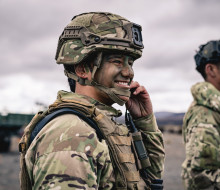
Keeping skills alive in transfer to Reserve Force
05 July 2024
Unfortunately you are viewing this website on an outdated browser which does not support the necessary features for us to provide an adequate experience. Please switch to a modern browser such as latest version of Google Chrome, Mozilla Firefox, Apple Safari or Microsoft Edge.
Ngā mihi nui
Doug Reidy joined the Air Force when he was just 17. Now, the 81-year-old reckons it's time to try something different.
He’s retired after influencing and guiding generations of avionics technicians in both his military and civilian career, spanning more than six decades.
In 1961 the Berlin Wall was built, apartheid in South Africa was being condemned by the UN General Assembly and Soviet cosmonaut Yuri Gagarin completed the first orbit of Earth by a human.
It was against a backdrop of tumultuous international upheaval that the young Cantabrian from the rural town of Southbridge enlisted in the Air Force as a radar mechanic.
"When I left school I started an electrical apprenticeship in Christchurch. I had to board and I was paying about 70% of my salary on the board, so I talked with my uncle who thought I could find something a bit better than that."
After taking the exam to enlist at the local recruitment office, Mr Reidy said he'd like to join the Navy, but the recruiter suggested a career in the Air Force instead.
"I thought, why not? It provided a uniform, accommodation, medical and dental, which sounded good to me." After initial training, he, along with a handful of others, travelled by railcar to Base Woodbourne to begin his radar fitter training.
In 1966 the young aviator was posted to No. 41 Squadron, which was stationed at Singapore, maintaining Bristol Freighter aircraft around the South-East Asia region including during the Indonesia-Malaysia Confrontation which saw him earn the General Service Medal 1962 with Borneo Clasp.
"That was really an education. Every morning we would do a supply drop to our Army people in their camps. In the afternoon we would swim in the lake up the road.
"Quite often after finishing the air drops, the Royal Air Force would plan to do a drop in the afternoon - and sometimes their aircraft would break down, so we would do their drop for them." During this deployment, Mr Reidy's fiancé, who he had met during initial training, travelled to Singapore where the pair married. They adopted three children who were lucky enough to travel with their parents on overseas deployments and to bases around Aotearoa.
On his return home from Singapore, Mr Reidy was posted to Woodbourne, before advancing his training back in Wigram.
In 1977 he moved to Ohakea, where he worked on Andovers and DC-3s.
"We did a few interesting trips including trips with the King and Queen of Tonga - we had to remove some seats to install a bed for them.
"One morning they couldn't find the Queen and they couldn't work out what had happened, but she was down at the beach in the water up to her knees collecting paua. Another trip while I was working at No. 42 Squadron was to fly Princess Margaret from Fiji to Vanuatu - that was something different."
After a short stint posted to Wellington, Mr Reidy's avionics expertise saw him seconded to the United States, so in 1981 he and his family packed up and deploye to Baltimore for two years to consolidate his skills.
On his return, Mr Reidy was posted to Base Auckland where he began a long affiliation with the new P-3 Orion fleet.
He designed and produced programming sets for the Automatic Test Equipment that supported fault confirmation of P-3 avionics components.
In 1989, after reaching the rank of Warrant Officer, it was suggested the avionics technician might want to swap the workshop for an office. It was a suggestion that didn't sit well with him.
"So I resigned from the Air Force and applied for a civilian role in the avionics workshop. I've seen a lot of changes in software over the years.
“Over the past 63 years, the culture has also changed quite a lot, it’s more of a relaxed attitude around senior officers. There are certainly more women in the Air Force than when I joined – and there were none in the engineering trade when I enlisted.”
Mr Reidy looks back on his career fondly and was especially pleased to have been able to take part in numerous sporting codes over the years.
"It builds comradeship with people other than those you work with. And if you are good enough, you can go away and represent your country."